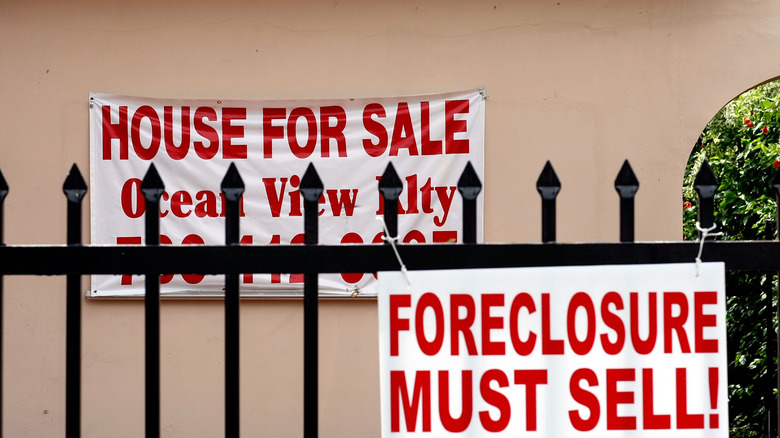What A Potential Stock Market Crash Could Mean For Your Home Value
Fears of a potential stock market crash are rising as economists warn that record-high tech company valuations, rapid AI-driven speculation, and persistent interest rate uncertainty have created conditions that are important to watch if you're planning to buy or sell a home anytime soon. Among the most vocal is hedge fund manager Michael Burry, known for calling, and hugely profiting from, the 2008 housing crash. In recent weeks, he and several other analysts have pointed to signs of investor euphoria reminiscent of past market peaks. While a market correction is not guaranteed, homeowners are beginning to question whether a major stock downturn will spill into the housing market as it has in the past.
Historically, stock market crashes don't immediately lead to falling home prices, but they often cause a negative chain reaction that has a measurable effect. When portfolios shrink, consumer confidence in the real estate market falls. Buyers delay their purchases while sellers hold back unless forced to move. Meanwhile, lenders react to market volatility by tightening mortgage standards. This makes home loans harder to obtain, more expensive, or both.
Past stock market crashes offer additional insight. During the dot-com bust in 2000, tech stocks collapsed but residential real estate remained largely stable. At the time, employment in non-tech sectors was (and remained) high. And, because the Federal Reserve cut interest rates after the crash caused a mild recession, demand for real estate actually increased. But combined with subprime mortgage lending practices and a consumer belief that home values could only go up, these and other factors created a housing bubble that would burst eight years later.
What a market downturn means for housing prices
When the stock market stumbles, real estate typically feels the impact through shifts in demand, lending standards, and economic uncertainty. The early 2020 pandemic downturn is a good example of how these dynamics can unfold differently depending on the broader economic backdrops (and backstops). When the stock market saw one of the fastest crashes in history, housing demand rebounded almost immediately because interest rates were slashed once again, this time to historic lows. Instead of falling, home pricing accelerated. Rapid price growth ultimately contributed to affordability pressures and created conditions that resemble another bubble many believe is about to burst.
Today's warnings involve a distinct set of risks. Analysts like Burry argue that rapidly increasing prices in AI-driven tech stocks mirrors the unsustainable enthusiasm and speculative excess of past bubbles. The fear is that as AI company earnings don't ultimately justify their inflated stock valuations, major investors will sell their holdings, and household wealth and credit availability will shrink, shifting real estate trends downward. Inventory may rise as sellers panic, while buyers will have less to spend, investors scale back, and lenders narrow their approval criteria. This could lead to stagnant home values, longer listing times, and in some regions, outright price depreciation.
Real estate markets do not shift as quickly or dramatically as the stock market, but the connection is worth monitoring as concerns around overvaluation grow louder. There is no foolproof way to protect yourself from a stock market correction. For most households, the best approach is staying focused on affordability, job stability, and long-term goals rather than reacting to short-term volatility.

